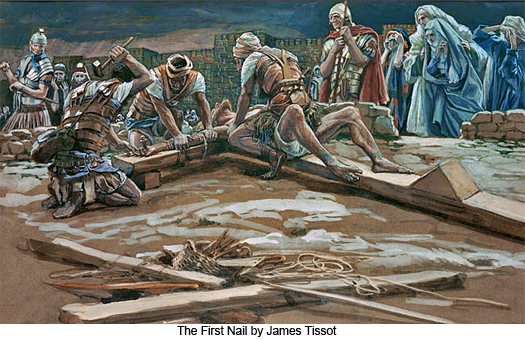
187:2.1 The soldiers first bound the Master's arms with cords to the crossbeam, and then they nailed his hands to the wood. When they had hoisted this crossbeam up on the post, and after they had nailed it securely to the upright timber of the cross, they bound and nailed his feet to the wood, using one long nail to penetrate both feet. The upright timber had a large peg, inserted at the proper height, which served as a sort of saddle for supporting the body weight. The cross was not high, the Master's feet being only about three feet from the ground. He was therefore able to hear all that was said of him in derision and could plainly see the expression on the faces of all those who so thoughtlessly mocked him. And also could those present easily hear all that Jesus said during these hours of lingering torture and slow death.
187:2.2 It was the custom to remove all clothes from those who were to be crucified, but since the Jews greatly objected to the public exposure of the naked human form, the Romans always provided a suitable loin cloth for all persons crucified at Jerusalem. Accordingly, after Jesus' clothes had been removed, he was thus garbed before he was put upon the cross.
187:2.3 Crucifixion was resorted to in order to provide a cruel and lingering punishment, the victim sometimes not dying for several days. There was considerable sentiment against crucifixion in Jerusalem, and there existed a society of Jewish women who always sent a representative to crucifixions for the purpose of offering drugged wine to the victim in order to lessen his suffering. But when Jesus tasted this narcotized wine, as thirsty as he was, he refused to drink it. The Master chose to retain his human consciousness until the very end. He desired to meet death, even in this cruel and inhuman form, and conquer it by voluntary submission to the full human experience.
187:2.4 Before Jesus was put on his cross, the two brigands had already been placed on their crosses, all the while cursing and spitting upon their executioners. Jesus' only words, as they nailed him to the crossbeam, were, "Father, forgive them, for they know not what they do." He could not have so mercifully and lovingly interceded for his executioners if such thoughts of affectionate devotion had not been the mainspring of all his life of unselfish service. The ideas, motives, and longings of a lifetime are openly revealed in a crisis.
187:2.5 After the Master was hoisted on the cross, the captain nailed the title up above his head, and it read in three languages." Jesus of Nazareth—the king of the Jews." The Jews were infuriated by this believed insult. But Pilate was chafed by their disrespectful manner; he felt he had been intimidated and humiliated, and he took this method of obtaining petty revenge. He could have written "Jesus, a rebel." But he well knew how these Jerusalem Jews detested the very name of Nazareth, and he was determined thus to humiliate them. He knew that they would also be cut to the very quick by seeing this executed Galilean called "The King of the Jews."
187:2.6 Many of the Jewish leaders, when they learned how Pilate had sought to deride them by placing this inscription on the cross of Jesus, hastened out to Golgotha, but they dared not attempt to remove it since the Roman soldiers were standing on guard. Not being able to remove the title, these leaders mingled with the crowd and did their utmost to incite derision and ridicule, lest any give serious regard to the inscription.


